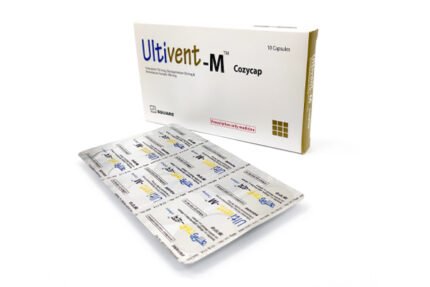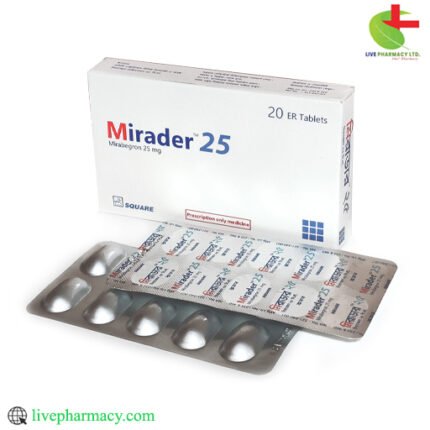Magnide 365
50.00৳ Strip
- Magnide: A comprehensive mineral supplement addressing diverse health concerns
- Relieves symptoms of magnesium deficiency
- Manages cardiovascular irregularities, muscle spasms, and gynecological issues related to pregnancy
- Essential for over 600 cellular reactions, supporting bone health, brain function, and muscle performance
- Well-tolerated formulation ensures efficacy and safety for optimal health maintenance
 Brand
Brand
|
Square Pharmaceuticals PLC |
|---|---|
 Generics
Generics
|
Magnesium Oxide |
Indications
Magnide serves as a remedy for various conditions, including:
- Alleviating symptoms associated with magnesium deficiency.
- Addressing issues within the cardiovascular system such as accelerated heartbeat, irregularities, heart attacks, angina pectoris, and hypertension ranging from mild to severe.
- Managing nerve and muscle-related concerns like sudden and excessive muscle spasms (tetani), muscle cramps, gastrointestinal cramps, heightened muscle and nerve stimulability, calf cramps, and stress-induced cramps in newborns or young children.
- Gynecological conditions linked to childbirth and infant care, including preterm spasms, cervical insufficiency, early membrane rupture, pregnancy spasms (eclampsia/pre-eclampsia, requiring tocolysis with betamimetic), and painful menstrual periods.
- Orthopedic issues such as calcification and ossifications.
- Preventing the formation of renal calculi (preventing the recurrence of calcium oxalate urolithiasis).
- Treating diabetes and migraines.
Pharmacology Overview
Magnesium, abundant in nature and found in many foods, is a vital mineral essential for human health. It participates in over 600 cellular reactions in the body, crucial for bone health, brain function, heart rhythm, and muscle activity.
Its mechanism involves preventing or controlling convulsions by impeding neuromuscular transmission and reducing acetylcholine release at motor nerve terminals. Magnesium’s CNS depressant effect is noted, yet it poses no adverse effects on women, fetuses, or neonates when used appropriately in conditions like eclampsia or pre-eclampsia.
Approximately 24-76% of ingested magnesium is absorbed through the gastrointestinal tract, primarily passively in the small intestine. Most of the magnesium in human serum is bound to proteins, with albumin and globulin being major carriers. Magnesium interacts with numerous human proteins and is primarily excreted through the kidneys.
Dosage & Administration Guidelines
For patients aged 12 and above, the recommended daily dose is 1-2 tablets. If a dose is missed, take it as soon as remembered, unless it’s almost time for the next dose. In such cases, skip the missed dose and adhere to the regular medication schedule. Avoid doubling up on doses.
Interactions
Magnide’s efficacy may be influenced by other medications. Before using Magnide, consult your doctor if you are taking:
- Muscle relaxants (non-depolarizing neuromuscular blockers).
- Certain antibiotics (aminoglycosides, nitrofurantoin, penicillamine, tetracyclines, fluoroquinolones).
- Digoxin (for heart failure).
- Lithium (for mood stabilization and depression control).
- Sodium polystyrene sulfonate (for potassium elimination).
- Cellulose sodium phosphate (for kidney stone prevention).
- Other magnesium-containing medicines (including magnesium enemas).
- Barbiturates, opioids, and hypnotics.
- Nifedipine (for hypertension or cardiac issues).
- Levothyroxine-containing drugs (for thyroid disorders).
Contraindications
Do not use this medication without consulting your doctor if you have severe kidney disease. Inform your doctor about any other medical conditions, allergies, or concurrent medication usage.
Side Effects
Common side effects may include diarrhea and cramping, while serious side effects like itching, rash, mood changes, dizziness, weakness, fatigue, nausea, and vomiting require immediate medical attention.
Pregnancy & Lactation
Consult your doctor before using Magnide during pregnancy or breastfeeding.
Precautions & Warnings
- Adhere to the recommended magnesium dosage to avoid adverse effects.
- Inform your doctor if you have allergies to magnesium, antacids, laxatives, or any other medications.
- Limit the use of this supplement as an antacid (no longer than two weeks) or as a laxative (no longer than one week) unless directed otherwise by your doctor.
- Disclose any history of liver, kidney, heart, or intestinal issues, high blood pressure, or special dietary requirements to your healthcare provider.
- Administer other medications at least two hours before or after taking Magnide.
Therapeutic Class
Magnide falls under the categories of antacids and oral electrolyte preparations.
Storage Instructions
Store Magnide below 25°C, protected from light and moisture. Keep all medications out of children’s reach.













Reviews
There are no reviews yet.